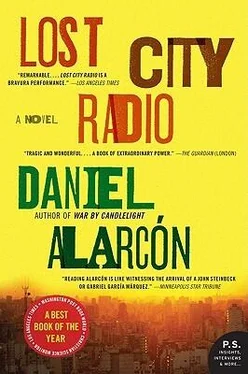The undercover scratched his temple. He pulled out his badge again and handed it to Rey. “It’s real, you know. You might show me a little respect.”
Rey shrugged and returned the badge.
“I knew your uncle. He trained me and I served under him. Before they turned on him.”
“And?”
“And I owe him everything. I loved that man. He was good to me. So I’m doing him a favor.”
“By following me?”
“By warning you.”
“I live within the law.”
The cop was just a kid. “All the good guys do.”
“Trini did.”
“Are all of you this rude?”
“All of us?”
“You know what I mean.”
Rey frowned. “I swear I don’t.”
“Listen, I’m just telling you what I know. I saw your name on a list. I saw both your names.”
Rey looked up. “I haven’t used that name in years.”
“Good. Don’t. Some people on this list are no longer with us.”
They had come to the end of the street. They doubled back. The woman was finished washing her clothes. She coughed as they walked by, and approached meekly to ask for money. She followed them for a bit, with an extended hand, but there was no conviction in her voice, and the young detective shooed her away. When they were back to the avenue, the undercover began to turn away from the university. “You were at the Moon, weren’t you?” he asked.
Rey nodded. “Years ago.”
“It’s busy over there these days. You don’t want to go back.”
There was nothing to say to that.
“Trini deserved better,” the cop said.
“We all did,” said Rey. “The world owes us.” He thanked the young man. “See, we’re not all rude.”
“It’s good to know. Be careful, that’s all.” The young man held out his hand, and Rey shook it. They turned in opposite directions down the avenue.
“MOTHER,” MANAU said, “you’re boring him.” He stood at the door of the kitchen, arms folded. Victor had the bowl of soup at his lips. A chicken bone lay on the table.
Manau’s mother blanched. “Now Elijah, don’t be rude.”
“The soup is very good, madam,” Victor said.
Norma patted him on the head.
“Your boy is so polite,” Manau’s mother said to Norma. “Not like my son.”
“Mother.”
“Thank you, madam,” said Norma.
Manau’s mother smiled sweetly. “Will you be staying then?”
Norma said they would. Manau’s mother nodded and went off hurriedly to prepare a bed. They would sleep in Manau’s room, of course. Norma didn’t even have a moment to answer. Then it was the three of them, in the kitchen. The boy had finished eating. He hadn’t touched his spoon. He turned his chair toward Norma and Manau, and the two adults sat. What else was there to do?
“Do you want to know about your father?” Norma asked.
The boy nodded. She couldn’t recall with any certainty how much time had passed: had it been a year or a day? Had the boy aged, or had she? There was nothing of her husband in him, or nothing that she could find: he was young still, and perhaps that was it, but his thin face and dark skin didn’t seem at all like Rey’s. He had small lips and smooth cheeks. Rey’s eyes had been hazel green, and this boy’s eyes were nearly black. Was it even true? Norma took a deep breath. None of it was the boy’s fault. She wanted her voice to come out steady. “The night I met him,” she began, “he was taken from me by some bad men. They hurt him and then they gave him back to me. I always knew they could take him again. He was very handsome, I thought so, and very smart, like you. He must have loved you, if he sent you to me.”
Manau cleared his throat. “Your mother told me. It was a few months ago. She wanted you to meet Norma one day. She didn’t expect that day would come so soon.” He looked down at his feet.
Victor rubbed his face. “Okay,” he said.
“This is too much right now. Isn’t it?”
The boy had nothing to say.
“It is, it is,” Norma said. “I left the station this morning, you know. They’re looking for us.” It wasn’t clear whom she was talking to. Norma stood and turned away. She opened the refrigerator, peering inside absentmindedly, inhaling its chemical coolness, and closing it again. I should climb inside, she thought. Shut myself in and die.
Her bones hurt.
“They won’t find you here,” Manau said. “They won’t look for you here.”
“Who’s looking for you?” Manau’s mother said. She had just walked in.
“No one,” Manau said.
“It’s complicated,” added Norma.
Manau’s mother looked hurt for a second. “I can see no one is tired here,” she said after a pause. She put her hands up. “Won’t you three help me with something?”
Norma, Manau, and Victor followed her out of the kitchen and into the dining room. There was a neglected, half-empty cabinet of glassware, and a sliding door with a long, slanting crack across its face. Beyond it was a square patch of grass no more than two meters across. A light was on outside, and Norma could see the small yard was well tended. She gave Manau’s mother a smile, this precious woman. She smiled back and pointed at the table, where an unfinished puzzle was spread out on a white piece of cardboard. Dozens and dozens of missing pieces were piled in each corner. Norma leaned over the still-forming picture: there were yellow buildings and a mountain beginning to take shape in the distance. A palm tree or two sprouted in the foreground.
“What’s this?” Norma asked.
Manau’s mother handed her the box. Of course: it was the Plaza in the Old Quarter. A few shoeshine boys sat on the steps of the cathedral. A woman in a sundress strolled with a parasol, to guard against the bright sunlight, and, in the center, a brass band with trumpets raised high played what was certainly a patriotic song. Norma could have been there the very day this picture was taken. It was easy to forget that the city had been beautiful once, that its elegant plaza had once been the beating heart of a nation’s capital.
“I just love puzzles,” Manau’s mother said.
They all sat down, Victor with his knees on the chair, and each took a handful of puzzle pieces to sift through. It was brilliant, Norma thought. This woman was brilliant. Norma wanted to weep. She stared down at the table. The puzzle suddenly absolved them of the need to speak, and they fell quickly into the rhythm of it: examining a piece, its colors and textures, scanning the box to see where it might fit. Her city as it had been once, the city where she’d fallen in love with Rey.
Manau’s mother took the box. “I grew up here,” she said to Victor, pointing with her pinky, down a side street that came off the plaza. “Just three blocks away.” She smiled and ran her fingers through her white hair. “It was just a village then.”
Norma’s mother had always called it a village, too, as in, “Your father has slept with every tramp in this village…” But so much had changed. As a girl, Norma had walked the four sides of this plaza. It didn’t exist anymore. For most city residents, its name evoked not this image from the not-so-distant past but something more recent: a great massacre that had occurred in the final year of the war. On Sundays, as a girl, Norma would go there with her father to watch the marching bands. It was a tradition in those days: a casual crash of a cymbal, and the city dwellers looked up from their reverie, and everything was put on hold. A half-dozen musicians and a conductor, quite presentable in a black suit, passing a hat through the crowd. Once, after a particularly rousing number, a conductor had taken the flower from his lapel and placed it delicately behind Norma’s ear. With a broad, gap-toothed smile, he announced the next song, and dedicated it to “a princess.” He said those exact words! She was nine years old, with pale skin and pretty eyes. She wore a dress with yellow flowers on it, and they were all looking at her. Then her father whispered that she should curtsy, and she did, to the appreciative applause of the gathered crowd. Even now, nearly forty years later, she was nodding to the crowd, thank you, thank you, color gathering in her cheeks.
Читать дальше












